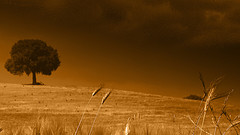First, I think I need to start this entry by saying that I’m a personal believer in prayer (although I must confess that I didn’t really know how to pray until I was forty, even though I grew up in a Christian home—but that’s another story), and a practitioner. In fact, I believe in prayer such that I don’t make it a practice to open class lectures with prayer for fear that it become reduced to merely a utilitarian function of quieting a roomful of students, getting their attention, and signaling the “start†of class. Prayer has its place and its function, and it isn’t utilitarian. I believe in prayer, but I don’t believe in “magical thinking.”

I’ve been watching the print on the “scientific†studies of prayer with both interest and skepticism. I find attempts to “prove†the validity of prayer as a practice an unnecessary activity, and ultimately, perhaps misguided. The experiments are interesting insofar as I’m interested in research methodology. But the findings, as David Haas reports in Prayer: A Neurological Inquiry, are, not surprisingly, “inconclusive.†Haas’ short article can make for an interesting conversation starter for a class discussion.
He makes one point (which, when I’ve raised in the company of “spiritualists,†would-be Jedi masters, and martial art aficionados has stopped the conversation dead and marked me as an unbeliever (yeah, I need to hang out with a different crowd of people) that can help put things in perspective, namely, there never has been scientific evidence for ESP, cosmic Chi, telekinesis, or other cosmic mind-over-matter phenomenon. But then, like my spiritualist, Jedi, and Kung Fu friends—as it is with any true believer—it’s a matter of faith, not proof.
Haas wrote:
Like all mental states, prayers are neither matter nor energy. Thus, they are not transmissible to or readable by another being by any means within the laws of nature. Whether they can be known to a supernatural being hinges on the effects of the prayers’ solicitations as judged by proper scientific studies.
I believe that people want to believe; in fact, it’s probably more true to say that people need to believe. But I think it’s important to believe for the right reasons. And I think it’s important to be clear about upon what it is that one sets one’s faith. My hunch is that those who require constant “proof†or “evidence†for their beliefs or faith are on shaky ground to start with. After all, the opposite of faith is not doubt, it is certitude.

“I wondered why the baseball was getting bigger. Then it hit me.”

3 Responses to Prayer, The Force, Energy, and Causality